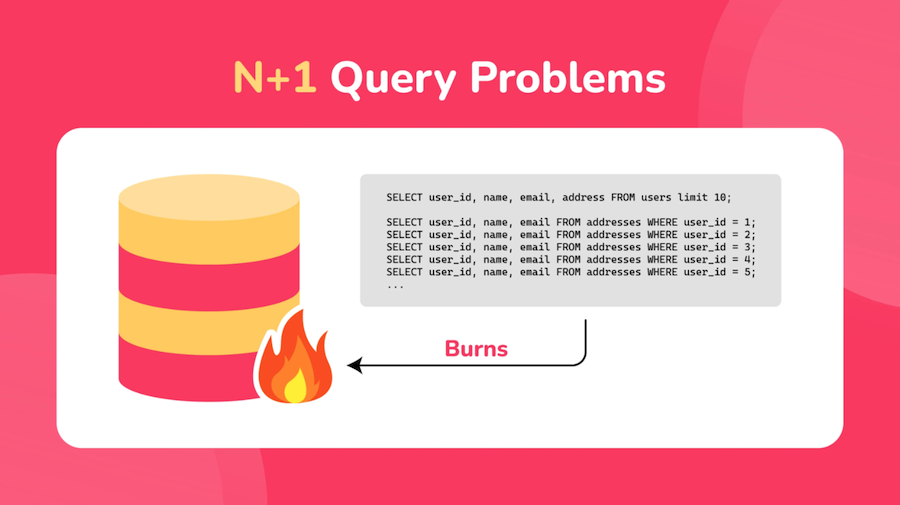028.Joins, Preload, Eager load và Includes trong Rails.

N+1 query là vấn đề muôn đời, cơ bản và chủ yếu khiến cho app của bạn chậm, bài viết này để nhắc lại cách sử dụng các câu lệnh join, preload, eager load và includes để giải quyết N+1 trong Rails application.
1.Setup vấn đề
rails g scaffold Author email name
rails g scaffold Post title:string rating:float author:belongs_to
rails db:migrate
class Author < ActiveRecord::Base
has_many :posts
end
class Post < ActiveRecord::Base
belongs_to :author
end
nolan = Author.create!(name: "Nolan", email: "nolan@outlook.com")
rick = Author.create!(name: "Rick", email: "rick@gmail.com")
harry = Author.create!(name: "Harry", email: "harry@hotmail.com")
nolan.posts.create!(title: "Hello world", rating: 3.6)
nolan.posts.create!(title: "Clean code", rating: 4.1)
rick.posts.create!(title: "Hello world", rating: 3.8)
harry.posts.create!(title: "Rich dad, Poor dad", rating: 4.3)
Yes, N+1 xảy ra khi bạn cố lấy danh sách của author, và sau đó lấy list những posts của author đó. 1 query cho author, và N query cho posts.
Author.all.each do |author|
author.posts.each do |post|
puts post.title
end
end
# Author Load (0.7ms) SELECT "authors".* FROM "authors"
# Post Load (0.5ms) SELECT "posts".* FROM "posts" WHERE "posts"."author_id" = $1 [["author_id", 1]]
# Post Load (0.5ms) SELECT "posts".* FROM "posts" WHERE "posts"."author_id" = $1 [["author_id", 2]]
# Post Load (0.2ms) SELECT "posts".* FROM "posts" WHERE "posts"."author_id" = $1 [["author_id", 3]]
2.Preload
Cùng xem lại cách giải quyết N+1 bằng preload.
Author.preload(:posts).all.each do |author|
author.posts.each do |post|
puts post.title
end
end
# Author Load (1.0ms) SELECT "authors".* FROM "authors"
# Post Load (1.1ms) SELECT "posts".* FROM "posts" WHERE "posts"."author_id" IN ($1, $2, $3) [["author_id", 1], ["author_id", 2], ["author_id", 3]]
3. Eager load
So sánh với Eager load
Author.eager_load(:posts).all.each do |author|
author.posts.each do |post|
puts ''
end
end
# SQL (1.5ms) SELECT "authors"."id" AS t0_r0, "authors"."email" AS t0_r1, "authors"."name" AS t0_r2, "authors"."created_at" AS t0_r3, "authors"."updated_at" AS t0_r4, "posts"."id" AS t1_r0, "posts"."title" AS t1_r1, "posts"."title" AS t1_r2, "posts"."author_id" AS t1_r3, "posts"."created_at" AS t1_r4, "posts"."updated_at" AS t1_r5 FROM "authors" LEFT OUTER JOIN "posts" ON "posts"."author_id" = "authors"."id"
4. Includes
Như bạn thấy ở trên, eager load sẽ dùng LEFT OUTER JOIN để lấy dữ liệu ở bảng chính và bảng quan hệ. Còn preload thì cho ra 2 câu query.
Vậy còn includes có tác dụng gì?
Khi chúng ta dùng includes, chỉ đơn giản là chúng ta sẽ sử dụng preload hoặc eager load, nhưng Rails sẽ quyết định một cách linh động thay chúng ta. Với case ở trên, includes sẽ sử dụng preload.
Author.includes(:posts).all.each do |author|
author.posts.each do |post|
puts post.title
end
end
# Author Load (121.1ms) SELECT "authors".* FROM "authors"
# Post Load (1.5ms) SELECT "posts".* FROM "posts" WHERE "posts"."author_id" IN ($1, $2, $3) [["author_id", 1], ["author_id", 2], ["author_id", 3]]
Vậy khi nào thì includes sẽ dùng eager load? Là khi bảng quan hệ có thêm điều kiện, như là where hoặc order
Author.includes(:posts).where("posts.title = ?", "Hello world").references(:posts).each do |author|
author.posts.each do |post|
puts post.title
end
end
# SQL (2.9ms) SELECT "authors"."id" AS t0_r0, "authors"."email" AS t0_r1, "authors"."name" AS t0_r2, "authors"."created_at" AS t0_r3, "authors"."updated_at" AS t0_r4, "posts"."id" AS t1_r0, "posts"."title" AS t1_r1, "posts"."title" AS t1_r2, "posts"."author_id" AS t1_r3, "posts"."created_at" AS t1_r4, "posts"."updated_at" AS t1_r5 FROM "authors" LEFT OUTER JOIN "posts" ON "posts"."author_id" = "authors"."id" WHERE (posts.title = $1) [[nil, "Hello world"]]
4.1. Associate with condition
Với LEFT OUTER JOIN, kết quả trả về sẽ là tất cả các những bài post thỏa mãn điều kiện, và những author của những bài post đó.
Vấn đề là nếu như chúng ta cần tìm những author có post với title là “Hello world”, kèm theo tất cả những posts của họ thì phải làm sao?
Author.joins(:posts).where("posts.title = ?", "Hello world").preload(:posts).each do |author|
author.posts.each do |post|
puts post.title
end
end
# Author Load (1.7ms) SELECT "authors".* FROM "authors" INNER JOIN "posts" ON "posts"."author_id" = "authors"."id" WHERE (posts.title = $1) [[nil, "Hello world"]]
# Post Load (0.4ms) SELECT "posts".* FROM "posts" WHERE "posts"."author_id" = $1 [["author_id", 1]]
Okay, nhưng mà khoan, còn nếu ngược lại, chúng ta lấy tất cả author, nhưng chỉ kèm theo những bài post có title là “Hello world”, thì sẽ ra sao?
Ở đây sinh ra một số giải pháp tạm thời.
class Author < ActiveRecord::Base
has_many :post
has_many :hello_world_posts, conditions: {title: "Hello world"}, class_name: "Post"
end
Author.includes(:hello_world_posts).all
hoặc là
Author.includes(:posts).references(:posts).where('posts.title' => ['Hello world', nil])
Nhưng cách đảm bảo hơn là sử dụng gem, như là N1Loader, Brick, activerecord_where_assoc.
Cái nào hay dở thì các bạn tự thử nhé.
5. Joins
Vâng, vậy thì còn joins thì để làm gì? Ờm, lúc này thì joins của Rails thực hiện đúng như joins của SQL, chỉ dùng để thêm điều kiện ở bảng quan hệ. Và đã không còn phần load dữ liệu ở bảng quan hệ vào bộ nhớ nữa.
Bài toán lúc này sẽ là “Tìm tất cả những tác giả có bài viết có title là ‘Hello world’”. Phần “kèm theo bài viết” đã được bỏ đi.
6. Một số lưu ý.
Từ rails 6, ưu tiên sử dụng hash thay cho string để mô tả các điều kiện trong where, và điều này khiến cho references trở nên khá phế.
# Before rails 6
Author.includes(:posts).where("posts.title = ?", "Hello world")
# SQLite3::SQLException: no such column: posts.title (ActiveRecord::StatementInvalid)
# no such column: posts.title (SQLite3::SQLException)
# After rails 6
# BAD
Author.includes(:posts).where("posts.title = ?", "Hello world").references(:posts)
# GOOD
Author.includes(:posts).where(posts: { title: "Hello world" })
preload cho tốc độ tốt hơn eager load, và mặc định includes sẽ ưu tiên sử dụng preload nên là thôi, cứ sử dụng includes cho khỏe.



Comments